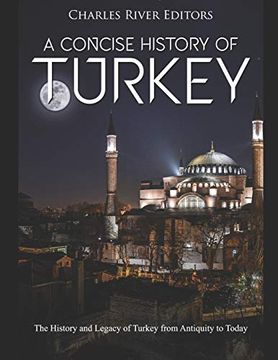A Concise History of Turkey: The History and Legacy of Turkey From Antiquity to Today (en Inglés)
Reseña del libro "A Concise History of Turkey: The History and Legacy of Turkey From Antiquity to Today (en Inglés)"
*Includes pictures*Includes a bibliography for further readingIt was not until the excavations of the 1930s that many of the relics, reliefs, and clay tablets that offer so much information about Persian life could be studied for the first time. Through archaeological remains, ancient texts, and work by a new generation of historians, a picture can today be built of this remarkable civilization and their capital city. Although the city had been destroyed, the legacy of the Persians survived, even as they mostly remain an enigma to the West and are not nearly as well understood as the Greeks, Romans, or Egyptians. In a sense, the Achaemenid Persian Empire holds some of the most enduring mysteries of ancient civilization. Of course, one of the reasons the Persians aren't remembered like the Greeks is because of the way the Greco-Persian Wars ended. The Ancient Greeks have long been considered the forefathers of modern Western civilization, but the Golden Age of Athens and the spread of Greek influence across much of the known world only occurred due to the Greeks' victory in two of history's most important wars. In 491 BCE, following a successful invasion of Thrace over the Hellespont, the Persian emperor Darius sent envoys to the main Greek city-states, including Sparta and Athens, demanding tokens of earth and water as symbols of submission, but Darius didn't exactly get the reply he sought. According to Herodotus in his famous Histories, "Xerxes however had not sent to Athens or to Sparta heralds to demand the gift of earth, and for this reason, namely because at the former time when Dareios had sent for this very purpose, the one people threw the men who made the demand into the pit and the others into a well, and bade them take from thence earth and water and bear them to the king."In terms of geopolitics, perhaps the most seminal event of the Middle Ages was the successful Ottoman siege of Constantinople in 1453. The city had been an imperial capital as far back as the 4th century, when Constantine the Great shifted the power center of the Roman Empire there, effectively establishing two almost equally powerful halves of antiquity's greatest empire. Constantinople would continue to serve as the capital of the Byzantine Empire even after the Western half of the Roman Empire collapsed in the late 5th century. Naturally, the Ottoman Empire would also use Constantinople as the capital of its empire after their conquest effectively ended the Byzantine Empire, and thanks to its strategic location, it has been a trading center for years and remains one today under the Turkish name of Istanbul. In the wake of taking Constantinople, the Ottoman Empire would spend the next few centuries expanding its size, power, and influence, bumping up against Eastern Europe and becoming one of the world's most important geopolitical players. It was a rise that would not truly start to wane until the 19th century.During the period that preceded its collapse, the Ottoman Empire was at the heart of a growing rivalry between two of the competing global powers of the time, England and France. The two powers asserted their influence over a declining empire, the history of which is anchored in Europe as much as in Asia. However, while the two powers were instrumental in the final defeat and collapse of the Ottoman Empire, their stance toward what came to be known as the "Eastern Question" - the fate of the Ottoman Empire - is not one of clear enmity. Both England and France found, at times, reasons to extend the life of the sick man of Europe until it finally sided with their shared enemies. Russia's stance toward the Ottoman Empire is much more clear-cut; the rising Asian and European powers saw the Ottomans as a rival, which they strove to contain, divide and finally destroy for more than 300 years in a series of wars against their old adversary.

